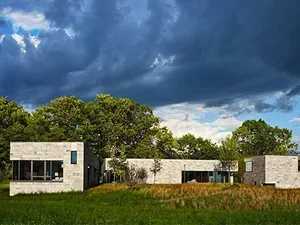CAPA: Related Content

Research Professor of Oceanography at Sea Education Association in Woods Hole, Massachusetts, Dr. Kara Lavender Law will speak on “A Global Look at Plastic in the Ocean.”

This grant was made possible by support from the National Endowment for the Humanities Supports Outstanding Publicly Engaged Humanities Programs.

Bennington College has awarded a total of $25,000 in grants to local organizations to implement and support seven community-proposed initiatives that explore and expand food systems in Bennington county.

Bennington College’s Prison Education Initiative (PEI) has been awarded a grant of $60,000 from the Mother Cabrini Health Foundation.

The US plastics industry’s contribution to climate change is on track to exceed that of coal-fired power in this country by 2030, finds The New Coal: Plastics & Climate Change, a report from CAPA Senior Fellow Judith Enck and the Beyond Plastics project.

This fall, Bennington College's Center for the Advancement of Public Action (CAPA) hosts the January 6 project, a six-week series examining the historical, cultural, and political events that led to the attack on the United States Capitol on January 6, 2021.

The Jacob and Valeria Langeloth Foundation has awarded Bennington College a $10,000 grant to support the Incarceration in America think tank that will be held October 1-2, 2021.

David Bond, Associate Director for CAPA, along with students Ahmad Yassir '20 and Cedric Lam ‘22, have launched a website that compiles all known information about the burning of millions of pounds of Aqueous Fire Fighting Foam (AFFF) by the US military.

Bennington College’s Prison Education Initiative (PEI) has been awarded a grant of $40,000 from the Mother Cabrini Health Foundation.

Bennington College has been awarded a grant of $25,000 from the Henry Luce Foundation to launch the Henry Luce Foundation Fellowship in Public Action for students studying at the College’s Center for the Advancement for Public Action (CAPA).

Bennington College has awarded a total of $20,000 in grants to local organizations to implement and support seven community-proposed initiatives that explore and expand food systems in Bennington county.

This winter, through the Food Insecurity & Population Health Fellowship, Bennington College will offer seven students fully-paid remote internships with organizations in the Bennington community focused on various dimensions of population health, with a special focus on food insecurity.

Onomatopee Press has published Art, Engagement, Economy: The Working Practice of Caroline Woolard, a monograph about the work of Caroline Woolard MFA '20, which arose from her MFA in Public Action.

Bennington College's Center for the Advancement of Public Action (CAPA) has joined a local collaboration, funded by a $50k Vermont Everyone Eats grant, that will support local restaurants and provide nutritious meals to Vermonters.

From her high school experience at United World College Changshu China to her current studies at Bennington College, a global academic perspective has informed the way Andreea Coscai ’22 now reflects on growing up in Bucharest, Romania.

On October 22, CAPA hosted a webinar conversation about the 2020 Presidential Election with former Governor Michael Dukakis.

On October 12, CAPA and the Robert Frost Stone House Museum hosted a webinar on Storage Crops, featuring a panel of experts who shared how to store vegetables through the winter and answered gardening questions.

EuropeNow Journal's October 2020 issue highlights the work that Bennington College students and faculty have done in partnership with the Consortium on Forced Migration, Displacement, and Education.

Throughout this summer and fall, the Bennington College community has come together to donate produce from local gardens and glean apples from trees on the College’s property in order to benefit Bennington food pantries.

Applications are now being accepted through October 31 for 2021 Community Resource Fund Grants.

The Center for Advancement of Public Action (CAPA) at Bennington College has received its second commission from the U.S. State Department's Office of Art in Embassies for the art collection at the new U.S. Consulate in Chiang Mai, Thailand.

On September 14, CAPA and the Robert Frost Stone House Museum hosted a webinar on Fall Preparations for Winter Gardens, featuring a panel of experts who shared what they are doing in their fall gardens and answered gardening questions.

On August 24, CAPA and the Robert Frost Stone House Museum hosted a webinar on Food Preservation, featuring a panel of experts who shared how they are preserving food this season and answered questions about food preservation and gardening.

Watch the keynote address of SolarFest, featuring Storm Cunningham, a global thought leader in community revitalization and natural resource restoration, co-hosted with the Center for the Advancement of Public Action at Bennington College, thanks to a grant from the Regenerative Food Network.

On May 18, CAPA and the Robert Frost Stone House Museum hosted a webinar on Resilience Gardening in Bennington, featuring some of our community's expert gardeners who answered questions on everything from compost to keeping plants healthy to saving seeds, and much more.

Thirteen students in Tatiana Abatemarco's Resilience and Food Access in Bennington, VT course presented their market basket study, which analyzes the availability of healthy foods in an area, to the Bennington Hunger Council via Zoom.

From 113 entries received from students around the country, Rachel Huang from Flushing, Queens, NY; Athena Tumbelekis from Geneva, NY; and Artley Whipple from Orinda, CA have been selected as winners of the Beyond Plastics Earth Day poster contest.

During the COVID-19 pandemic, twenty-two Bennington College students are interning for local organizations working to support food sustainability, public health, family initiatives, and other resources for Bennington community members.

Bennington College's Prison Education Initiative (PEI) has partnered with fellow members of The New York Consortium for Higher Education in Prison (NY-CHEP) to provide protective face masks for all incarcerated individuals in New York State.
